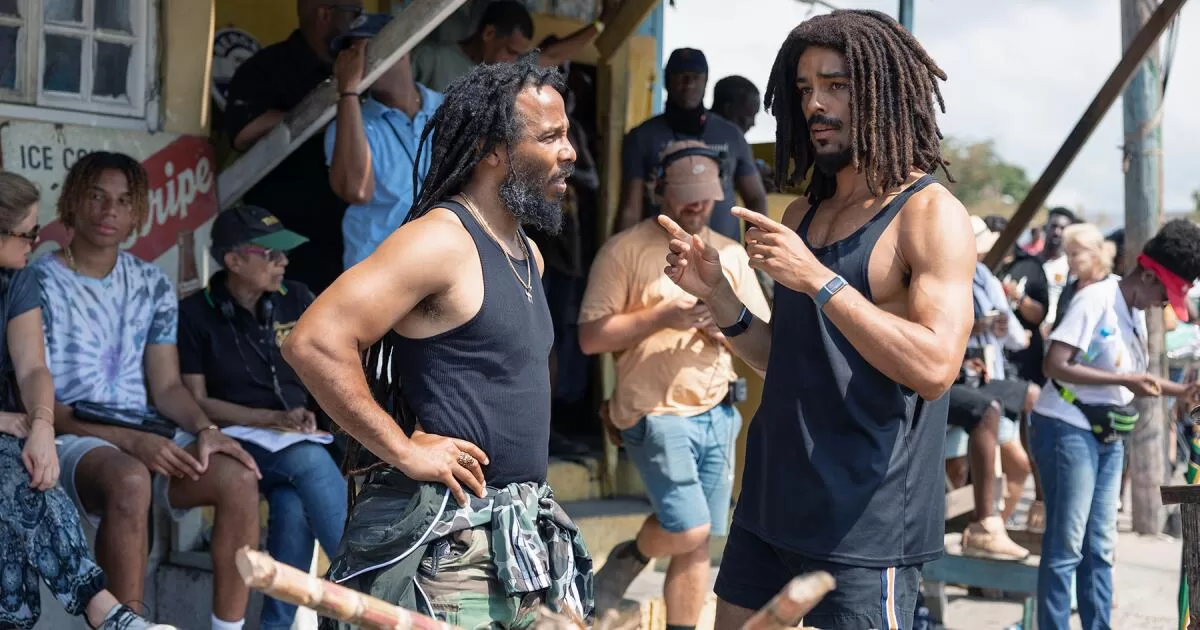It turns out that no defecting was necessary.
Paramount’s “One Love” opened bigger than projected Wednesday, earning $14 million — the best Valentine’s Day midweek take ever, Deadline reported. The film also earned a Rotten Tomatoes audience score of 95% — although it was less popular with critics, whose aggregate rating currently sits at 44%.
But it wasn’t stats or profits that brought Ziggy Marley to his first film project, he told Billboard in an interview Wednesday. David Nesta “Ziggy” Marley, 55, is Bob Marley’s eldest son and was only 12 when his father died in 1981.
“My father’s story, it carries a message with it” the Grammy winner said. “I think now is the time for this message of one love to be put in the global view.”
“One Love” narrows its focus to a formative chapter of Bob Marley’s life that coincided with a period of fierce political divisions in Jamaica. The movie chronicles the singer and political activist’s near assassination in Kingston in 1976 and his subsequent trip to Europe to record and tour his ninth studio album “Exodus,” released in 1977. The biopic concludes as the singer returns to Jamaica for the One Love Peace Concert in 1978, which drew over 30,000 attendees.
Ziggy Marley said this season of his father’s life “made him decide what his purpose was.” The screenplay quotes almost verbatim from Bob Marley: “If my life is for myself, I don’t want it. My life is for people.”
“This is who Bob Marley is,” Ziggy Marley said. “We don’t need for [sic] tell a story from birth to death to know this.”
Still, there were some scenes Ziggy Marley struggled to part with, including one in which the Wailers fight and break up.
“When you start editing a movie, it kind of unfolds and tells you what it wants to be,” he said, and scenes like this one just “didn’t fit.”
But in the case of the band‘s breakup, he added, smiling, that it will be released as a deleted scene in the future.
Piecing the film together, Ziggy Marley said, was a negotiation between his vision and that of director Reinaldo Marcus Green.
Ziggy Marley first approached Green when he was still editing “King Richard” — the biographical sports drama about Richard, Venus and Serena Williams that went on to win Will Smith an Oscar in 2022. But it wasn’t his work on “King Richard,” which hadn’t yet been released, that got Ziggy Marley’s attention. It was “Stone Cars,” a 14-minute, low-budget short Green had filmed in South Africa nearly a decade prior.
“The fact that that was what pulled him in made me realize, ‘Oh, he wants something real,’” Green told Vogue in early February.
“I liked the authenticity of it,” Ziggy Marley told Billboard. “I liked the grit, how it looked, and I liked that it was being real to that culture.”
That authenticity carried into the musician’s relationship with the director, who was brutally honest with the singer from the moment he saw the first script.
“He’s in it for the real thing,” Ziggy Marley said, “not like somebody to come, like, tell you what you want to hear or lift up your ego, but working to what is the best thing for the film.”
Still, Green was always respectful of the Marley family’s commitment to “telling the story how we wanted to tell it,” Ziggy Marley said.
That meant filming in Jamaica where half the film takes place — the other half unfolds in England — and hiring mostly Jamaican actors, or actors who have Jamaican heritage, including Lashana Lynch, who plays Bob Marley’s wife Rita Marley.
In the end, the studio employed more than 400 Jamaican cast and crew and more than 1,800 background actors to deliver 25 days of filming on the island, CEO of Paramount Pictures and Nickelodeon Brian Robbins said at the movie’s Jan. 23 premiere in Kingston.
Robbins also said Paramount made significant investments in Trench Town, the backdrop of Bob Marley’s childhood — including the construction of an outdoor learning pavilion and security booths at the Trench Town Primary school.
“In my heart of hearts, it was like Bob doing this for the community,” Ziggy said.
While the film’s more somber scenes won most moviegoers over — including Rita, who shed tears during the film’s premiere — the ones Ziggy says he loves most showcase Bob Marley’s unusual, and often ill-understood, humor.
“Those type of moments just make me laugh and say, ‘Yeah, that’s exactly how it was with Bob.’”
